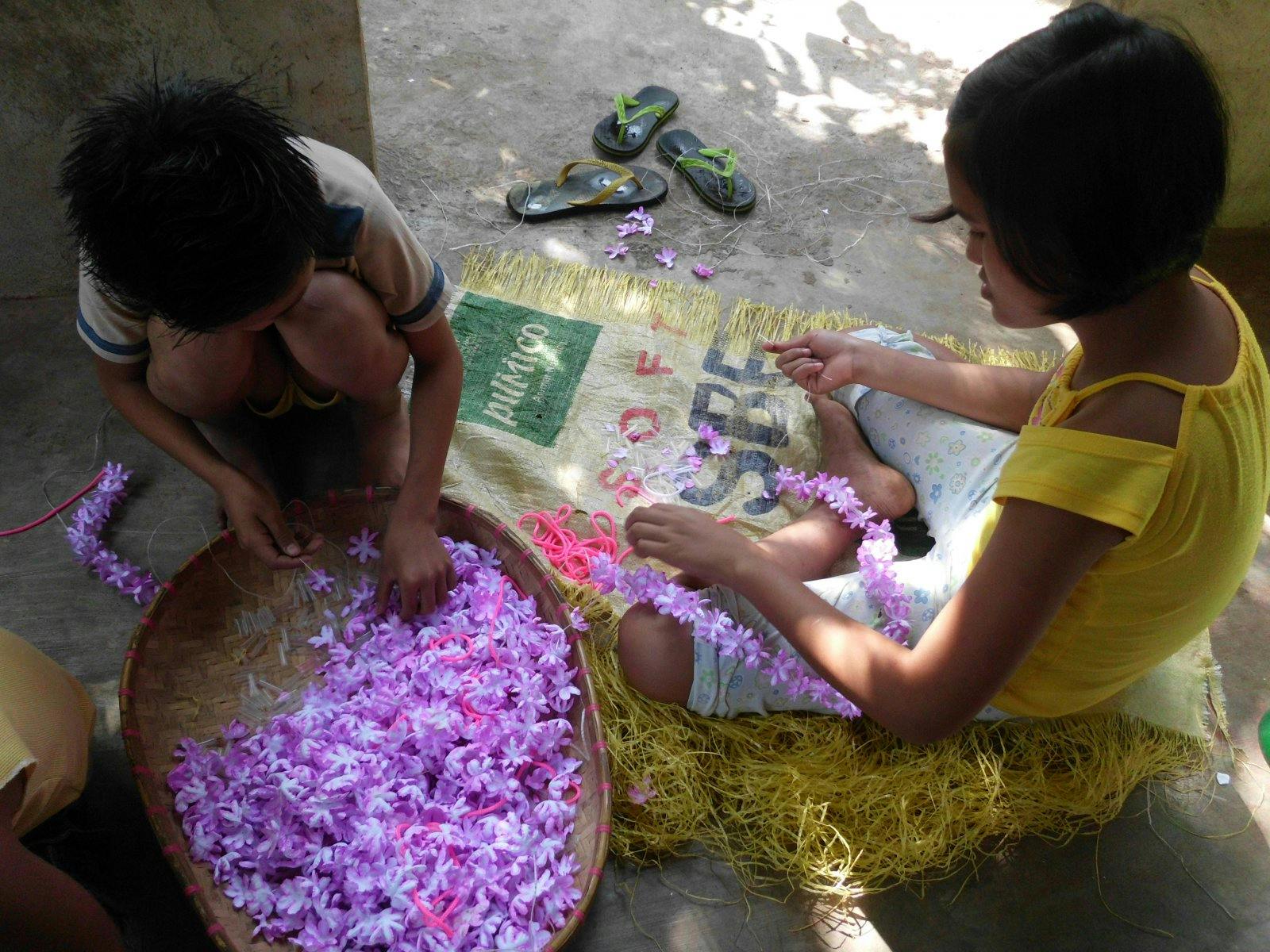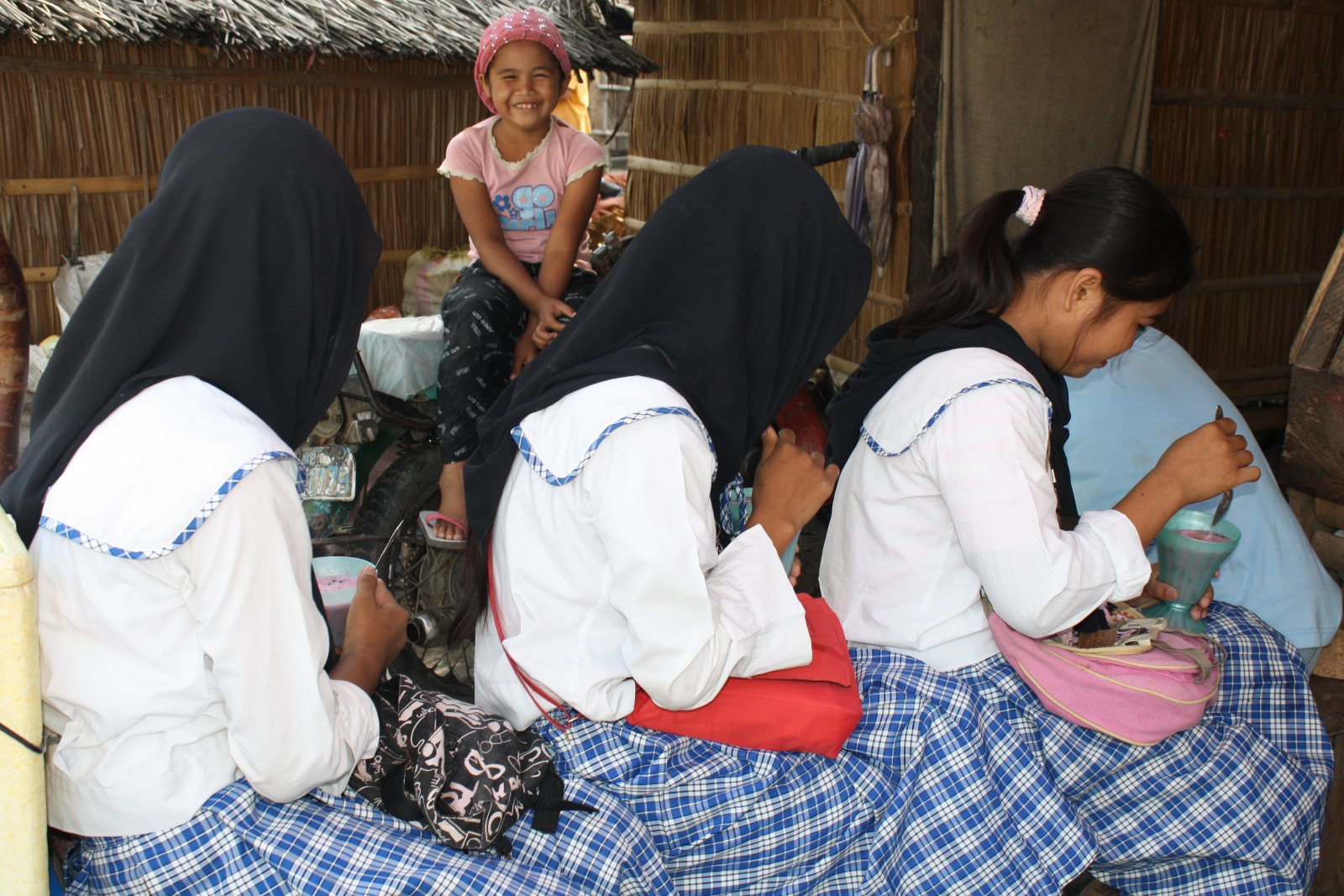Of garlands and graduation tales through the generations
May 28, 2019
Story

Casey and her brother Ryan string paper flowers into garlands. These are sold during graduation ceremonies. Photo taken on March 8, 2014 by libudsuroy. CreativeCommons

Stringing paper flowers has been Grandma Yolanda’s rite of marking a new year of work for six years now. As the dust from the previous night’s fireworks is wiped from the bamboo chairs, she takes a seat and starts by waxing the five-petal paper blooms and throws the heaps into a flat basket, then her daughter Alma and her grandchildren, Loli and Casey, would take some plastic yarn, and begin stringing flowers from the basket.
Later, the paper blooms will be interspersed with satin ribbons in gold, silver and red. Each day, chatter, songs and the radio soap operas enliven their tasks. The garlands are sold at P12 a dozen to a wholesale buyer. Grandma Yolanda and her brood make between 200 to 400 necklaces a day. These trinkets are sure sellers at graduation rites in March all over the island. At the gates of schools and universities, a throng of vendors will be selling these garlands. Every graduate is expected to wear at least one garland given by well-wishers. By then, the leis would fetch between 20-30 pesos (50 US cents) a piece.
“A pittance, you might say, but we do earn and it is better than none at all. It is also a good way to spend some vacant hours,” she tells me, speaking from the lode of insight learned from almost half a century of eking out a living from land.
“I have two regrets. One is that I have never been able to wear one around my neck because I never graduated, and two, my daughters never graduated from high school,” she laments. “Every time I work on these garlands, I remember how much I wanted to go to school, how much I wanted my daughters to finish high school. I only finished four years of elementary school. ”
YOLANDA
Born in the late 50s; finished elementary fourth grade
For Yolanda’s father, she said, functional literacy was enough. “As long as you know how to read and write, and count seeds and coins, and add and subtract, that’s enough to survive,” her father would tell his children. “Besides, you are a woman. You will stay at home and care for your children and husband. Your husband will work for you and your family as I am doing,” Yolanda remembered him telling her. He thought that farming and business, not education, would bring us wealth.”
So Yolanda learned how to plow with a carabao, plant rice and corn and raise livestock. Before she was 15, her father married her off with someone she did not love. Yet she did not question her father’s decisions. In the late 50s, a father’s word was decree, and a good daughter was an obedient, unquestioning and silent. She birthed five children in five years, and soon after her husband deserted her. Her parents helped her provide for her children’s needs. She studied dressmaking.
“It was a hard life, but we always had plenty of food on our table,” she recalled. With earnings from the farm and the dresses and pairs of pants she had sewn, she tried to send her children to school. The two boys finished high school and became skilled electricians, and got married in their late 20s. The three daughters barely began high school and dropped out to marry early, with barely her consent.
“When I think about how I survived, I saw that I could have done better if I had more years at school, even just high school. It has something to do with having more options and knowing more ways to solve problems. I always told my children that the land their grandfather will pass on to us will not be enough. By the 80s, the land was already infertile. We would invest so much in fertilizers and pesticides then long droughts or strong typhoons would come, and different bugs that were resistant to pesticides. Sometimes, there was no harvest.
“I do not know why I failed to convince my daughters. I kept on inspiring them to go to school. I tell them it would be easier to find less arduous work than farming if you have a degree, and if you opt to start a business you would know how to do it better. But still my daughters, like me, married early in their teens. Unlike me, they decided to get married young on their own. My consolation is that they all finished the elementary grades, which by the 70s was already compulsory. When they graduated from the elementary grades, there were no ready-made garlands for sale. I made them garlands made from fresh gardenia and everlasting and corsages of orchids and ferns."
In the Philippines, at the public elementary school level, which is provided free, during the school year 2010-2011, female Net Enrolment Ratio was computed at 91.07 per cent while the male NER was at 88.75 percent. This means that 9 out of every 100 girls and 11 out of every 100 boys aged 6-11 years old who did not go to school. The Gender Parity Index is set at 1.03: 103 girls to 100 boys. --National Census and Statistics Authority Gender QuickStart
ALMA
Born in the 70s, high school undergraduate
“I remember how Mother used to tell us to value schooling, and finish high school as prospects are better for those who have higher education. I was dreaming I would be working in an office as a clerk or a saleslady in a department store. But I fell in love with a construction worker and got pregnant at 14. My mother did not want me to get married yet and she said she can help take care of the child and I can get back to school, finish high school and get to college.
“But I decided to get married instead, and I have been married for 25 years now. I have a son and three daughters. My husband is a good provider. He is a skilled mason and carpenter, and because there is a boom in construction around town, he always has some contractual work. But he is much older than me, his health is declining.
“My mother Yolanda told me it was better to earn my own keep so that I would not be dependent on my husband’s income alone. So I am sort of a handywoman, I learned some skills like carpentry, dressmaking and cooking. She was happy we graduated from the elementary grades, at least , she told us, we have reached better education than she. She made us garlands made from fresh gardenia and everlasting and corsages of orchids and ferns on graduation day.”
More girls graduated from the elementary and secondary education during the same school year. The completion rate for females at the elementary level was 77.14 per cent (77 girls for every 100) while male completion was 67.65 (68 boys for every 100). The GPI was 1.14 (104 girls for every 100 boys)- Philippine Commission on Women Gender Fact Sheet
LOLI
Born in the early 2000s, senior high school
Loli told me she was really bent on finishing high school. “Our batch would be the last to follow the four-year program for high school. By next school year, high school would last for six years. That’s was what was on my mind when I left home in November last year. I thought it was the best way I could finish high school and still keep my sanity. Everyday my mother kept telling me I would fail, that I would get pregnant and follow my sister’s path. Her words were like daily sermons to me. She could not understand why I needed to have a cell phone and get regular loads. She cannot understand why I have to frequent the internet café because of the online research assigned to us in my science classes. I got depressed and angry. I could not take it anymore. I understood she meant well but it did not feel all right to be subjected to the verbal flood,” she said.
So she left home, stayed with an aunt in another village and transferred to another high school. She was confident she could make it through the last four months of senior high school. She did not.
“It appeared easy to succeed. Tuition was free and even as I transfered to another school I retained a scholarship grant from a Japanese foundation that provided for almost everything I needed including a transportation allowance, books and school supplies. Then, in January I got invited to a party where I met a man who convinced me to work for him as a runner for his illegal gambling business. It was good at first and I was happy to earn for the first time. I bought my own smartphone and a tablet,”she recalled. Then, she had a run-in with the police and so she decided to leave him.
“When I tried to return to school, I could not. I was absent from my classes for so long, the teachers would no longer accept me. So I lost my senior year, and missed the chance to graduate. If I go back to school, I have to stay for three years more because of the curriculum change.”
Last month, she met a military sergeant who offered her what she thinks is the best deal ever that she cannot refue. He said we can get married and he can send me to school. We agreed that I should not get pregnant until I can finish high school . So we will practice family planning and use contraceptives.
She said she had asked forgiveness from her parents. “I had been a headache to them these past months. This is one story that I will tell my children. But I will make sure I will find a way of telling them so that none of them will feel pressured to leave the family when they are still unprepared. My mom had said that she would make me two dozens of garlands if I can graduate in 2017. She’d better be prepared with those leis because I will work hard to make that possible.
The female completion rate in the secondary school is higher at 80.27 per cent (80 in every 1000 girls). Male completion rate is 69.88 or 70 for every 100 boys). The Gender parity Index is 115 girls for every 100 boys.-- PCW Gender Fact Sheet
CASEY
Born in 2000s, elementary graduate
Casey, Yolanda’s granddaughter by her second daughter, has just graduated from the elementary grades. Four years ago, when she was in grade 2, she barely had passing grades. Her father lost a job and it was difficult to have regular meals. Her grandmother took her and her two brothers in, and she sent them to school.
“It was not easy to live with Grandma. We have little time for play as we have to do house work with her. But we learned to cook and wash our clothes and clean the house on our own,” she recalled. But she persevered.
Last year, her family was recipient of the government’s conditional cash program which provide funds for the children’s education and health needs. Most of the money was spent for jeepney fares to and from the school at the center of the village and for their daily meals. The program has been extended so that Casey is assured that she will have financial support through six years of secondary education.
“I will have to see what is possible. I want to be a nurse but that might be too expensive. I might try to find work after high school. Or I can be a science teacher. We are told that we can get jobs right after high school now because our courses will be technical and vocational.I just hope I won’t fall in love and marry early. My cousins are all getting married after high school or even before high school. And it hurts my grandma and my aunts. My grandmother and mother have forbidden me to have a boyfriend. I also cannot own a cellphone of my own because they the cell phone make it easy for young people to get married early. Whether I will marry or not, I would like make sure that I will take care of my mother and grandmother when they grow old."
Yesterday, the photos taken at Casey’s graduation were delivered. Grandma Yolanda paid almost a thousand pesos for those, an amount equivalent to almost three days work on the garlands. But Yolanda thinks the photos are worth it and Casey deserved them as souvenirs. In all the photos, Casey wore garlands on her neck. Some were made of paper flowers, and some were made of real, fresh blooms. Her Grandma Yolanda made them all for her.
Teenage pregnancies and marriages in the Philippiens are on the rise over a 35-year period. These teeange mothers and wives are predominantly poor, live in the rural areas and have low educational attainment.




